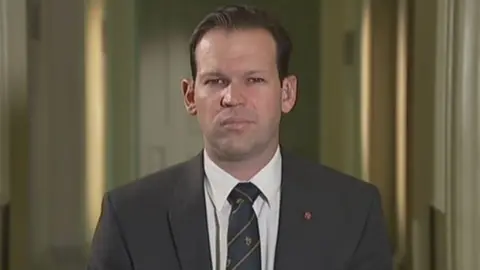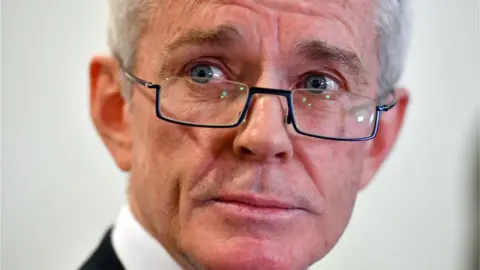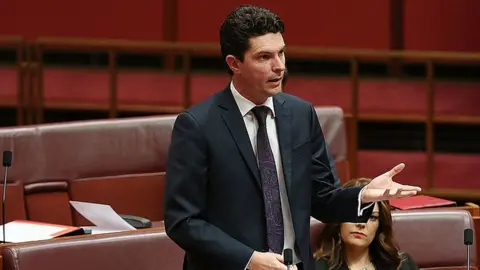Who is caught up in Australia's dual citizen saga?
 Getty Images
Getty ImagesFive Australian politicians have been disqualified from parliament for having dual citizenship when they were elected in 2016.
Among them is the deputy prime minister Barnaby Joyce, whose disqualification threatens the government's voting majority.
The nation's highest court found five of seven MPs under scrutiny were in breach of Australia's constitution which requires candidates for federal office to not be a "subject or citizen of a foreign power".
Most of the politicians said they had not known of their second citizenship when they were elected, and the government argued that only those who had "voluntarily obtained, or retained" their foreign citizenship should be disqualified.
However the court decided against that argument, and only ruled in favour of two MPs who they said did not attain citizenship.
So who are the affected politicians?
Barnaby Joyce, deputy prime minister
 EPA
EPADual citizenship: New Zealand (renounced in August)
How did he acquire it? Mr Joyce was born in Australia but his father is from New Zealand, which automatically awarded the politician citizenship.
His team argued Mr Joyce was "not aware of the possibility he might be a New Zealand citizen under New Zealand law."
What was his defence? Mr Joyce cannot be held to account for having only the "mere knowledge" of his father's birthplace, his legal team argued.
Unlike the other six, who are senators, Mr Joyce sits in the lower House of Representatives - meaning his ineligibility leaves the government's one-seat majority up in the air.
What did the court say? The court stuck to a literal reading of the constitution: if a politician had held actual dual citizenship at the time of their election, the election was invalid - regardless of whether they were aware of their dual citizenship or not.
In the case of Mr Joyce, the court acknowledged that at the time of his election in 2016, he believed the clause in question did not apply to him because he thought he was an Australian citizen only. The court also said Mr Joyce "has never applied to become a New Zealand citizen" and has "not sought or accepted any privileges as a citizen of New Zealand".
However, the court nonetheless ruled that because he was a citizen of New Zealand, he was "incapable of being chosen or sitting as a member of the House of Representatives".
Fiona Nash, government senator
 Reuters
ReutersDual citizenship: UK (renounced in August)
How did she acquire it? Australian-born Ms Nash became a UK citizen by descent through her Scottish-born father, to whom she was estranged for much of her life.
Her older sisters were born in England and have UK citizenship.
What was her defence? That like Mr Joyce she had no previous knowledge of her citizenship.
"Her parents had informed her that unlike in the case of her sisters, who were British citizens by birth, she could only become a British citizen upon making an application, which had not occurred," her submission said.
Her lawyer said laws that provided citizenship by descent were "exorbitant", and would disqualify MPs who had only a "slender connection" to a foreign power.
What did the court say? Fiona Nash's election was invalid because she held dual citizenship at the time of her election
Matt Canavan, government senator
 ABC
ABCDual citizenship: Italy (renounced in August)
How did he acquire it? Mr Canavan has Italian grandparents. In July, he said his mother had organised his citizenship - without his knowledge - when he was 25. But he later said his mother had not done this.
His lawyers said Mr Canavan gained his dual status through an Italian court decision on citizenship by descent in 1983.
What was his defence? His lawyers argued this was a "quirk of history" and said it was questionable whether Mr Canavan had even received Italian citizenship in the first place.
His lawyers also argued that if he did have citizenship, he should not be disqualified because he had no knowledge of his status. They said a strict interpretation of the rule would lead to political opponents conducting "genealogical witch hunts".
What did the court say? Matt Canavan's election was valid.
The court concluded that "given the potential for Italian citizenship by descent to extend indefinitely - generation after generation - into the public life of an adopted home", full Italian citizenship required the taking of "positive steps [...] as conditions precedent to citizenship".
Malcolm Roberts, One Nation senator
 EPA
EPADual citizenship: UK (renounced in December)
How did he acquire it?: Mr Roberts was born in India to a Welsh father in 1955, making him a UK citizen. He was naturalised as an Australian in 1974.
UK authorities said he revoked his citizenship five months after he was elected in Australia's July 2016 election.
What is his defence? Mr Roberts claimed he took "bona fide" steps to relinquish his citizenship, but it was not made official until 5 December.
His lawyers argued he had the strongest case of all the MPs because he had made clear attempts to rid himself of his citizenship prior to his election. However a court in September found that Mr Robert's efforts to do this had failed, and included attempts such as sending renunciation queries to the wrong email address.
What did the court say? Malcolm Robert's election was invalid because he held dual citizenship at the time of his election.
Nick Xenophon, independent senator
 Getty Images
Getty ImagesDual citizenship: UK (British Overseas Citizenship)
How did he acquire it? Mr Xenophon's father was born in Cyprus when it was a UK colony, and the politician inherited British Overseas Citizenship.
He has played down the "third-class citizenship" as not even allowing him to live in the UK, describing it as a "colonial peculiarity".
What was his defence? In addition to lack of knowledge, his lawyers argued that the unusual form of British citizenship did not include the "core" elements of citizenship.
A few days prior to the court hearings, Mr Xenophon flagged he would step down from office to re-enter state politics.
What did the court say? Nick Xenophon's election was valid.
While the court confirmed that Mr Xenophon did hold British Overseas Citizenship (BOC) at the time of his election, it ruled that it did not give him the full rights and privileges usually linked to full citizenship - most importantly the right to live and enter the UK without immigration control as a normal UK citizen would be able to.
The court concluded he was "not a subject or a citizen of the United Kingdom at the date of his nomination and election as a senator. Nor was he entitled to the rights and privileges of a subject or citizen of the United Kingdom."
Larissa Waters, former Greens senator
 Reuters
ReutersDual citizenship: Canada
How did she acquire it? Ms Waters was born in Canada but left as a baby with her Australian parents. She said she was oblivious to her Canadian status until July.
What was her defence? Unlike the previous five MPs, Ms Waters resigned over her dual citizenship. Her team did not try to defend her eligibility and instead said she had "properly complied" with the constitution.
Her lawyers argued the other politicians should have taken the same actions and urged the court not to reward "negligence" for those who had not investigated their citizenship status diligently.
The government included Ms Waters in its submission, a move she said was "pretty clear self-interest in trying to save their own, and a few extras".
What did the court say? Larissa Waters' election was invalid because she held dual citizenship at the time of her election.
Scott Ludlam, former Greens senator
 Getty Images
Getty ImagesDual citizenship: New Zealand
How did he acquire it? Mr Ludlam was born in New Zealand but his family left the country when he was three.
He said he had always believed - wrongly - that his New Zealand citizenship had expired when he became an Australian citizen in his teens.
What was his defence? Like Ms Waters, Mr Ludlam resigned and maintains he was right to do so. Ms Waters' legal team also acted for him.
The government argues that Mr Ludlam voluntarily retained his citizenship, and, along with Mr Roberts, should be ruled ineligible.
What did the court say? Scott Ludlam's election was invalid because he held dual citizenship at the time of his election.
